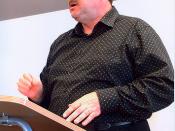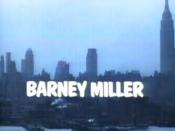Aristotle in the Poetics regards action as the most important element in tragedy. He thinks that : "without action there cannot be a tragedy there may be without character." He adds : "The plot, then, is the first principle , and, as it were the soul of a tragedy. Character holds the second place." Thus, Aristotle attributes the utmost importance to action. The characters come next. According to him, "the incidents and the plot are the end of a tragedy; and the end is the chief thing of all."
Miller in "Tragedy and the Common Man," on the other hand, did not allude directly to action but as Emily Edens notices in her M.A. Thesis: "His plays involve action, for without it his characters would have no opportunity to assert themselves against forces that attempt to degrade them. As he discusses his hero's nobility and active 'retaliation,' he reveals the importance of action within the drama.
In fact, his definitions of tragic character, the tragic feeling and the tragic flow would be incomplete without mention of action."
In "All My Sons", For example, action has a big role to play. As Overland remarks:
"In retrospect Miller found that the theme of All My Sons (1947) is the question of actions and consequences and the play dramatizes this theme in the story of Joe Keller - for whom 'there was nothing bigger than the family,' and his son Chris, For whom 'one new thing was made out of the destruction of the war' : A kind of responsibility - man for man."
Since the action in All My Sons has received great attention from miller, this section deals with the interrelationship between the language varies with the development of action and the discovery of delayed crime with its consequences. Miller's interest in the common man's language and his belief in its effectiveness is clear again here in his manipulation of the common man's language as he moves through the action to the climax and then to the denouement.
In the beginning of All My Sons, the action is very slow. Miller has intended to make it slow. As Miller himself remarks: "The play begins in an atmosphere of undisturbed normality. Its first act was later called slow, but it was designed to be slow. It was made so that even boredom might threaten, so that when the first intimation of the crime is dropped a genuine horror might begin to move into the heart of the audience, a horror born of the contrast between the placidity of the civilization on view and the threat to it that rage of conscience could create."
Act I begins in a daily chat; the reader or audience feels as if he were reading or watching a gossip scene. The Characters speak with no definite purpose. There is no significance in what they say insofar as action itself is concerned . Hence, the opening lines of the play are striking in their normality:
Jim: "Where is your tobacco?"
Keller: "I think I left it on the table ... Gonna rain tonight?"
Jim: "Paper says so?"
Keller: "Yea, right here."
The tone is not serious but relaxed. No serious problems crop up, no conflict erupts and no tension either. The subject of their talk is not the bigger issues of life but "tobacco," "rain" and "paper." Later, they continue to mention "want-ads," "parsley" and "Don Ameche." This, as Moss remarks, acts as "a verbal facade."
This normality begins to disappear with the development of the action and the unveiling of the crime. The tone becomes more serious and anxiety creeps in. A neighbour's reference to Larry's memorial tree "toppled" by a storm the night before has little impact until the mother enters. Her out burst of grief for the missing flier further disturbs the clam: "Because he is not coming back," Kate cries, "then I'll make myself!" (She Points to the tree). The mother's remembrances of the missing son are hints of the mystery of her son Larry's being reported missing. Hence, her presence always interrupts the placidity of the situation and thus changes the mood of the play. This is why her language is impressive - partly because it is full of transition words which create syntactic as well as semantic cohesion but mostly because of gapping and semantic cohesion. A more impressive effect is achieved through her short sentences that create a speedy effect expressive of her extremely emotional sensations.
The language follows a rhetorically logical line when the mother expresses her confidence that her son should be alive:
Ann: "Why does your heart tell you he's alive?"
Mother: "Because he has to be."
Ann: "But why, Kate?"
Mother: "Because certain things have to be, and certain things can never be. Like the sun ha to rise, it has to be. That's why there's God, so certain things can never happen."
Again, cohesion here, both semantic and syntactic, is carried to the utmost. One suspects that this is the direct voice of the author, the voice of Miller himself. Chris's language also has the same tincture: "Everything was being destroyed, see, but it seems to me that one new thing was being made. A kind of responsibility - man for man." Miller, thus, seems intent on changing the tone of the play.
Up to this point Keller is still standing by as a concerned spectator: "Well, that's only your business, Chris," he comments. He seems to be the most detached and least concerned of all the characters.
The more the secret of the crime is unveiled, the more the language becomes interrogative and the more precarious the mood of the play is. As Moss remarks:
"A more dynamic style mirrors the rising apprehension felt by Keller and his wife as their secret rises from the past. Their questions idly curious before, now become urgently incisive demanding immediate solution. 'Now what's going to happen to Mother? Do you know?' 'Why, Joe? What has Steve suddenly got to tell him that he takes an airplane to see him?' 'She don't hold nothing against me, does she? I mean if she was sent here to find out something.' "
Again, as Moss remarks, the verb "know" occurs almost two hundred times which indicates the characters' need to know in All My Sons, the characters struggle throughout the play to discover through action a missing link.
When Chris finds out the truth, the truth of his father's guilt, his language becomes ostensibly interrogative and exclamatory. Most of his utterances are in exclamations or interrogatives. He dose not only want to know why things have happened this way but why all issues are what they are. His wish to know and his perplexity mark the climax of the play. He asks his father: "Explain it to me or I'll tear you to pieces! ... God in Heaven, what kind of man are you? ... Where do you live, where have you come from? ... What the hell do you think I was thinking of, the goddam business? Is that as far as you can see? The business? What is that, the world of business? What the hell do you mean, you did it for me? What the hell are you?" As Cohn remarks, these questions contribute vivacity to the play's dialogue.
Chris's language achieves its effect through his manipulation of short sentences. The rhythm here is swift and consequently impressive as a result of short sentences use of one or two syllable familiar words. Repetitions express Chris's emotional emphasis and his concern.
However, the father's answer indicates that he has not confessed his sin yet. He has not realized how he has destroyed twenty-one pilots: "Chris ... My Chris ...." He wants to arouse in Chris the father-son feelings of love through the repetition of the word Chris. The repetition of Chris here preceded by "My" shows his surprise at Chris's response and his wish to appease his anger.
Still what is remarkable about the language of Chris and Keller in the climax is that it is less colloquial than it was in the beginning. Respelling is scarcely used: "nothing," "thinking" and "marrying" are spelled out complete. Here, he does not represent words as they are pronounced in everyday conversational language, unlike pauses that occurred in the beginning which indicated the unavailability of stuff or chat and casualness, pauses here indicate perplexity and an in ability to find either the right question or the right answer. Contractions are less frequent here than at the beginning: "going to," written "gonna" in the beginning, now has an ordinary spelling.
The mood of the play changes. Chris's theory of social responsibility is expressed in plain terms: "Everything was being destroyed, see, but it seemed to me that one new thing was made. A kind of responsibility. Man for man." "Once and for all you can know there's a universe of people outside and you're responsible to it, and unless you know that you throw away your son because that's why he died." "I could jail him, if I were human any more. But I'm like everyone else now. I'm practical now."
Chris's declaration seem abstract. They tend to establish general truths. His language shows him less self-centered materialistic than his father; both have rhetorical modes of expressing themselves.
Larry posthumously speaks his shame at his father's guilt: "Every day three or four men never came back and he sits there doing business."
George has suffered from his father's disgrace: "When I was studying in the hospital it seemed sensible, but outside there doesn't seem to be much of a law." And Jim gave up the dream of becoming a researcher: "These private little revolutions always die . The compromise is always made. And you spend your life groping for it - but once it is out it never lights again." These concluding speeches are anti-climatic.
They are expressed in plain statements, void of interrogatives or exclamations, as opposed to the climax. Contrasted with the climatic language of Act I in their shortness, they depend on compound and complex sentences that produce lengthy utterances. Moral issues are summed up here; thus, convenient words are used: "responsibility," "compromise," "law." They are the most rhetorical lines of the play. Figurative language is effective and original in the denouement: "Those private little revolutions always die, .... One new thing was being made - a kind of responsibility,... groping for life." Thus, the audience feels a new style being used at the end, a style that underlines the moral question of the whole play.
On conclusion, Miller's attempt to couple language with action has been sustained throughout the whole play. And still, the common man's language has been employed: in the beginning of the play, we have conversational, everyday language; in the climax we have the common man's language tempered with the rhetorical questions and short rhythmical utterances. At the denouement, the common man's language teems with sententious declarations.
Miller's interest in the language of the common brow is a clear proof of the artist's belief in the effectiveness of the common man's colloquial language, and consequently of his belief in the capabilities of the common man, whom he believes to be "as apt a subject of tragedy in its high sense as kings were."


